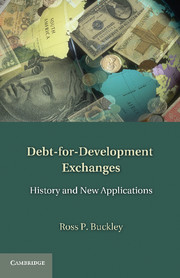Book contents
- Frontmatter
- Contents
- Acknowledgments
- List of Contributors
- Introduction: A Productive Partnership between Civil Society and the Academy
- Part I Types of Exchanges and Their Development over Time
- Part II Exchanges by Donor Countries
- 4 United States Debt Exchanges
- 5 Italian Exchanges
- 6 German Exchanges
- 7 French Exchanges
- 8 Other Donor Nations' Exchanges
- 9 Debt-for-Development Exchanges in Australia: Past, Present and Future
- Part III Critiques of Exchanges
- Part IV Innovative Applications of Exchanges
- Conclusion
- Index
- References
9 - Debt-for-Development Exchanges in Australia: Past, Present and Future
Published online by Cambridge University Press: 01 June 2011
- Frontmatter
- Contents
- Acknowledgments
- List of Contributors
- Introduction: A Productive Partnership between Civil Society and the Academy
- Part I Types of Exchanges and Their Development over Time
- Part II Exchanges by Donor Countries
- 4 United States Debt Exchanges
- 5 Italian Exchanges
- 6 German Exchanges
- 7 French Exchanges
- 8 Other Donor Nations' Exchanges
- 9 Debt-for-Development Exchanges in Australia: Past, Present and Future
- Part III Critiques of Exchanges
- Part IV Innovative Applications of Exchanges
- Conclusion
- Index
- References
Summary
INTRODUCTION
This chapter is an attempt to write the eight-year history of Australia's first debt-for-development exchange. This is a story not just about the benevolence of Australia, sacrificing money owed to it in order to assist poor Indonesian children suffering from tuberculosis. It is also a story about the consequences of rich-country policies that are designed to make their exporters competitive in a global marketplace, for these export finance policies and the debt accumulation of less developed countries are inherently linked. The relationship between a competitive trade policy and the accumulation of debt runs as a constant theme throughout this contribution.
The chapter is written from a perspective that is critical of what may be called the ‘debt-dependent development model’. This is not the simplistic belief that debt is always bad: many countries, such as Australia in the late 19th and early 20th centuries and, more recently, South Korea, have become development success stories, despite borrowing heavily in key periods. Rather, it is the more nuanced position that borrowing to facilitate development should be done selectively and with great caution, lest it lock one into a subordinate relationship to richer countries and financial institutions; and that unless the borrowing regime is a mature democracy (or an extremely enlightened autocracy) with a functioning development model, the borrowing will almost certainly produce more problems than solutions.
- Type
- Chapter
- Information
- Debt-for-Development ExchangesHistory and New Applications, pp. 93 - 114Publisher: Cambridge University PressPrint publication year: 2011
References
- 1
- Cited by



